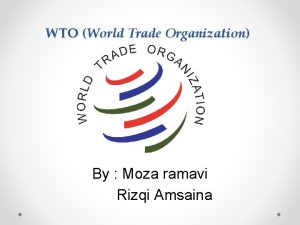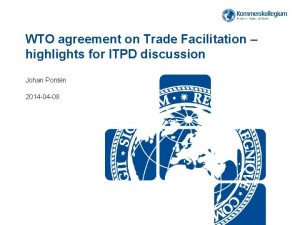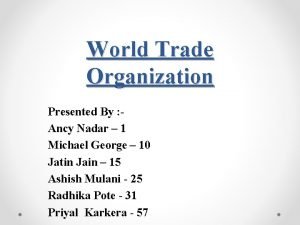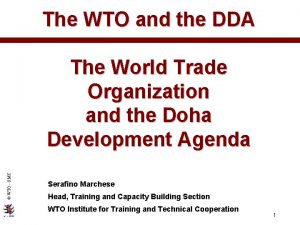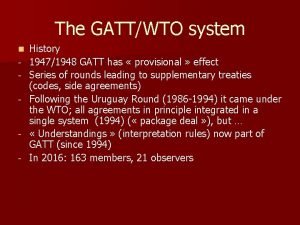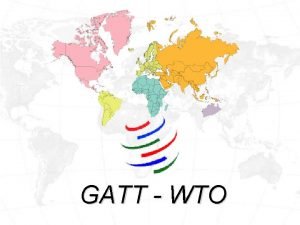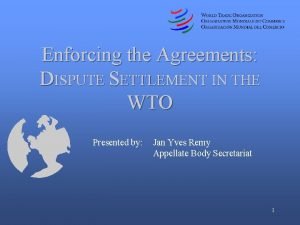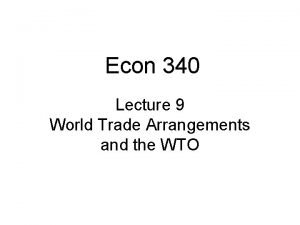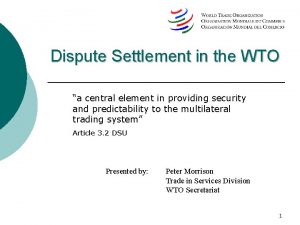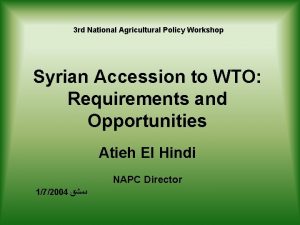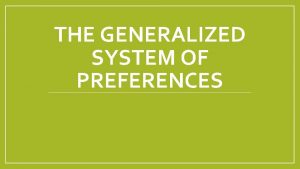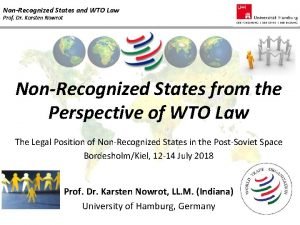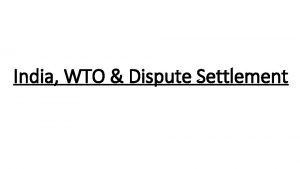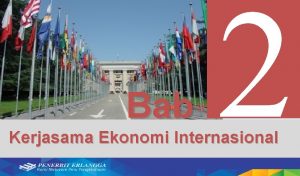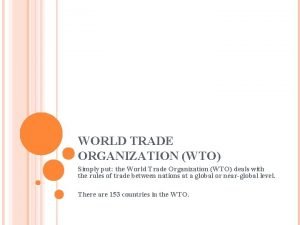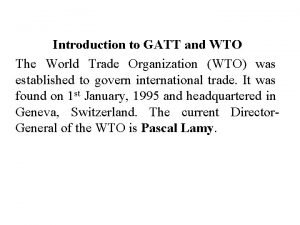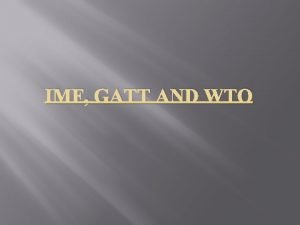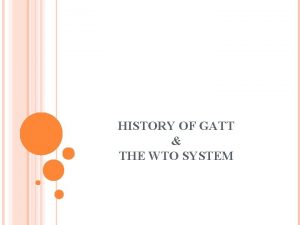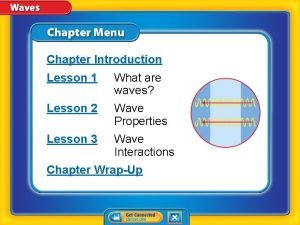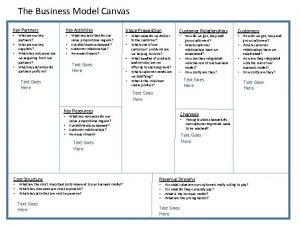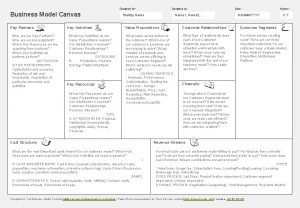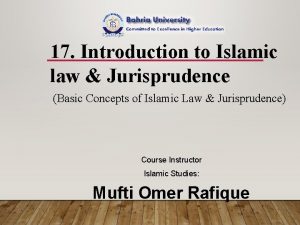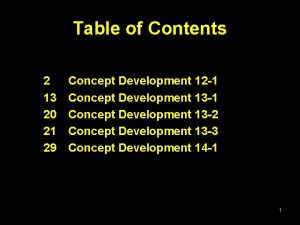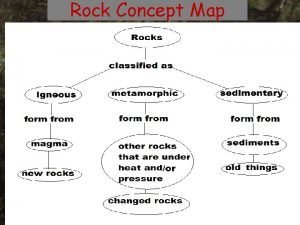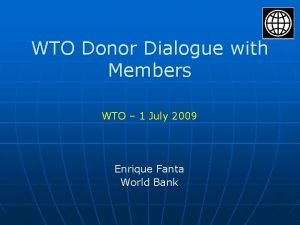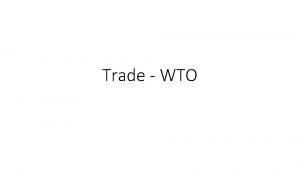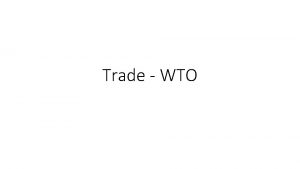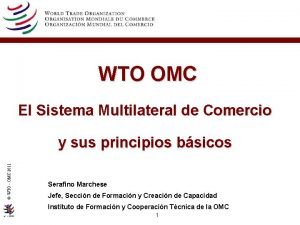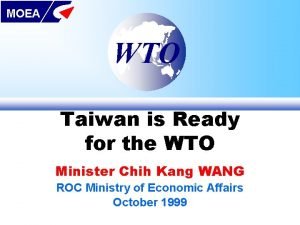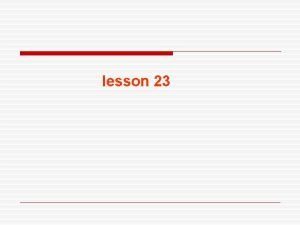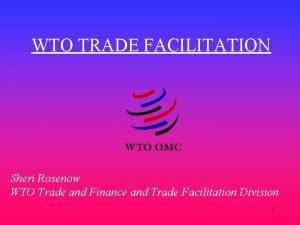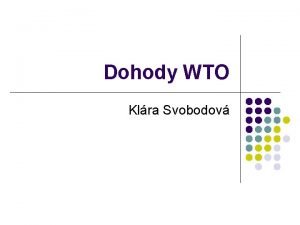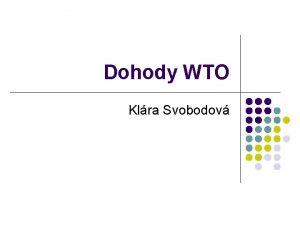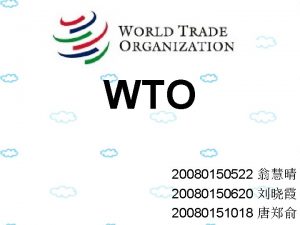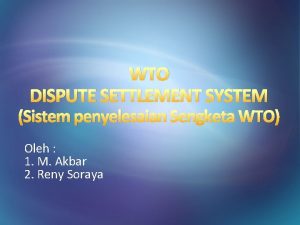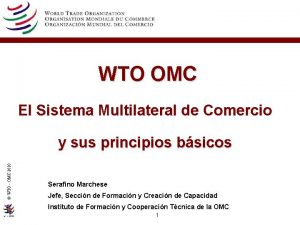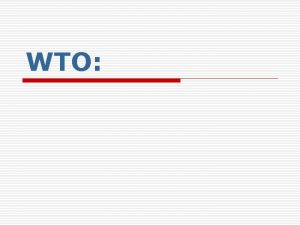Nondiscrimination a key concept in WTO law policy





































- Slides: 37


Non-discrimination • – a key concept in WTO law & policy • – an important characteristic of the protectionist trade politics pursued by many countries during the economic crisis of the 1930’s • – regarded by historians as an important contributing cause of the economic & political confrontation & crises that resulted in WWII • – in trade matters, it breeds resentment among the countries, manufacturers, traders, & workers discriminated against • – makes scant economic sense since it distorts the market in favour of products & services that are more expensive & or of a lesser quality • – the importance in eliminating this is highlighted in the preamble of to the WTO agreement

PRINCIPLES • MFN (most-favoured-nations) Treatment Obligation – prohibits a country from discriminating between countries • National Treatment Obligation – prohibits countries from discriminating against other countries

KEY PROVISIONS of the GATT 1994 (Nondiscrimination in trade in goods) • Article I, MFN Treatment Obligation • Article III, National Treatment Obligation KEY PROVISIONS of NONDISCRIMINATION in the GATS • Article II, MFN Treatment Obligation • Article XVII, National Treatment Obligation

• Prohibit discrimination on the basis of ‘nationality’ or the ‘national origin or destination’ of a product, service or service supplier. • Article X: 3 (a) of the GATT 1994, which requires that laws, regulations judicial decisions and administrative rulings of the general application pertaining to trade to be administered in a ‘uniform, impartial, & reasonable manner’. • In GATS, Article VI arguably provides for a similar obligation. • Exceptions allow for the ‘reconciliation’ of trade liberalisation with other economic and non-economic values & interests.

MOST-FAVOURED-NATIONS TREATMENT UNDER THE GATT 1994

Article I of the GATT 1994: “General Most-Favoured Nation Treatment” (1) With respect to customs duties and charges of any kind imposed on or in connection with importation or exportation or imposed on the international transfer of payments for imports or exports, and with respect to the method levying such duties and charges, and with respect to all rules and formalities in connection with importation and exportation, and with respect to all matters referred to in paragraphs 2 and 4 of Article III, any advantage, favour, privilege or immunity granted by any [Member] to any product originating in or destined for any other country shall be accorded immediately and unconditionally to the like product originating in or destined for the territories of all other [Members].

GATT 1994 Provisions requiring MFN or MFN-like treatment • • Article III: 7 (regarding internal quantitative regulations) Article V (regarding freedom of transit) Article IX: 1 (regarding marking requirements) Article XIII (regarding the non-discriminatory administration of quantitative restrictions) • Article XVII (regarding State trading enterprises) - Article XX of the GATT 1994, the “General Exceptions Provisions”, also contains an MFN-like obligation.

MULTILATERAL AGREEMENTS on TRADE in GOODS (that require MFN treatment) • TB Agreement • SPS Agreement • Agreement on Import Licensing Procedures • However, this section is only concerned with the MFN treatment obligation set out in Article I: 1 of the GATT 1994

Nature of the MFN treatment obligation of Article I: 1 of the GATT 1994 Appellate Body, EC – Tariff Preferences – settled that the MFN treatment obligation set out in Article I: 1 of the GATT 1994 is a ‘cornerstone’ of the GATT and ‘one of the pillars of the WTO trading system’

Appellate Body, US – Section 211 appropriations Act “For more than fifty years, the obligation to provide most-favourednation treatments in Article I of the GATT 1994 has been both central and essential to assuring the success of a global rules-based system for trade in goods. ” • Article I: 1 of the GATT 1994 – prohibits discrimination between like product origination in, or destined for, different countries • Principle purpose of the MFN treatment obligation is to ensure equality of opportunity to import from, or to export to, all WTO Members.

• Appellate Body, EC – Bananas III – the measure at issue was the import regime for bananas of the European Communities under which bananas from Latin American countries (dollar bananas), were treated less favourably than bananas from former European colonies (ACP Bananas)

“The essence of the nondiscrimination obligations is that like products should be treated equally, irrespective of their origin. As no participants disputes that all bananas are like products, the nondiscrimination provisions apply to all imports of bananas, irrespective of whether and how a Member categorized or subdivides the imports for administrative or other reasons. ”

Appellate Body, Canada – Autos: the issue was an import duty exemption accorded by Canada to imports of motor vehicles and those of related companies. As a result, only motor vehicles originating in a small number of countries benefitted from the exemptions.

GATT Panel, EEC – Imports of beef – found that EC regulations making the suspension of an import levy conditional on the production of a certificate of authenticity were inconsistent with the MFN obligation of Article I: 1 after it was established that the only certifying agency authorised to produce a certificate of authenticity was an agency in the US

Consistency with the Article I: 1 of the GATT 1994 Sets out a three-tier test of consistency • Whether the measure at issue confers a trade advantage of the kind covered by Article I: ! • Whether the products concerned are ‘like’ products • Whether the advantage at issue granted ‘immediately and unconditionally’ to all like products concerned

The MFN treatment obligation concerns: 1. 2. 3. 4. 5. 6. 7. 8.

In brief… • customs duties, other charges on imports and exports and other customs matters • internal taxes • internal regulation affecting the sale, distribution and use of products

• MFN Treatment Obligations not only concerns advantages granted to other WTO Members, but advantages granted to all other countries (including non-WTO members). If a member grants an advantage to a non-member, Article I: 1 obliges the member to grant that advantage also tot all WTO Members

Panel, US – MFN Footwear (US – Non. Rubber Footwear) “the rules and formalities applicable to countervailing duties, including those applicable to the revocation of countervailing duty orders, are rules and formalities imposed in connection with importation, within the meaning of Article I: 1”

Panel, US – Customs User Fee •

Panels, EEC – Imports of Beefs: the panel applied Article I: 1 to EC regulations making the suspension of an import levy conditional on the production of a certificate of authenticity.

EC, EC Banana III – contented before the Appellate Body that the Panel erred in concluding that the EC’s activity functions rules’ for the allocation of import licenses for bananas violated Article I: 1 “the Panel found that the procedural and administrative requirement of the activity function rules for importing third-country and non-traditional ACP bananas differ from, and go significantly beyond, those required for importing traditional ACP bananas. This is a factual finding. Also, a broad definition has been given to the term “advantage” in Article I: 1 of the GATT 1994 by the panel in United States – Non-Rubber Footwear. . . For these reasons, we agree with the Panel that the activity functions rules are an “advantage” granted to bananas imported from traditional ACP States, and not to bananas imported from other Members, within the meaning of Article I: 1. ”

Canada – Autos “Article I: 1 requires that “any advantage, favour, privilege, or immunity granted by any Member to any product originating in or destined for any other country shall be accorded immediately and unconditionally to the like product originating in or destined for the territories of all other Members. ” [Emphasis added] The words of Article I: 1 refer not to some advantages granted “with respect to” the subjects that fall within the defined scope of the Article, but to “any advantage”; not to some products, but to “any product”; and not like products from some other Members, but to like products originating in or destined for “all other” Members. ”

Debate on the Applicability of Article I: 1 • Safeguard Measures – makes it clear that the MFN treatment obligation normally applies to safeguard measures. The agreement does allow, under certain conditions, the discriminatory use of safeguard measures. • Anti-dumping duties – facts concerning dumped or subsidies exports • Countervailing duties – than not differ from country to country but should be applied will more often without discrimination

1960 Report of the Group of Experts on Anti-Dumping and Countervailing Duties • “In equity, and having regard to the most-favoured-nation principle the Group considered that where there was dumping to the same degree from more than one source and where that dumping caused or threatened material injury to the same extent, the importing country ought normally to be expected to levy anti-dumping duties equally on all the dumping imports.

Plurilateral Agreements – Advantages by a party to other parties to the Agreement on Civil Aircraft or to the Agreement on Government Procurement should, pursuant to Article I: 1, at least in principle, be accorded ‘immediately and unconditionally’ to all WTO members.

‘Like products’ • Article I: 1 concerns any product originating in or destined for any other country & requires than an advantage granted to such products shall be accorded to ‘like products’ originating in or destined for the territories of all other members. It is only between ‘like products’ that the MFN treatment obligation applies that discrimination is prohibited. Products are not ‘like’ may be treated differently.

Concept ‘of like products’ is also used in other GATT 1994 articles: • • II: 2 III: 4 VI: 1(a) IX: 2(c) XIII: 1 XVI: 4 XIX: 1

• Though the concept of ‘like products’ is not defined in the GATTT 1994, the Appellate Body considered in EC – Asbestos in its examination of the concept of ‘like products’ under Article III: 4, the dictionary meaning of ‘like’ suggests that ‘like products’ are products that share a number of identical or similar characteristics.

Like = Similar Echoes the language of the French version of Article III: 4 “produits similaire” and the Spanish version “productos similares”, however, the Agreement does not allow the discriminatory use of safeguard measures.

AB, Canada – Aircraft “dictionary meanings leave many interpretative questions open” 1. which characteristics or qualities are important in assessing ‘likeness’ 2. to what degree or extent must products share qualities or characteristics in order to be ‘like products’ 3. from whose perspective should ‘likeness’ be judged

Panel, Spain – Unroasted Coffee The Panel had to decide whether various types of unroasted coffee (“Columbian mild”, “other mild”, “unwashed Arabica”, “Robusta”) were ‘like products’ within the meaning of Article I: 1.

The Panel considered: • (1) the characteristics of the products • (2) their end use • 3) tariff regimes of other Members

Advantage granted ‘immediately and unconditionally’ 1973 legal opinion, (Accession of Hungary to the GATT, Secretariat) • “the prerequisite of having cooperation contract in order to benefit from certain tariff treatment appeared to imply conditional MFN treatment and would, therefore, not appear to be compatible with the GA. ”

Panel, Indonesia – Autos & AB, Canada – Autos: Found with respect to the requirement under Article I: 1 that advantages are granted ‘unconditionally and immediately’

• Belgium – Family Allowances case, a dispute of 1952 concerning a Belgian law providing for an exemption from a levy on products purchased from countries which had a system of family allowances similar to that of Belgium was not granted ‘unconditionally’ and that the Belgian law was inconsistent with the MFN treatment obligation of Article I: 1.
 Negara pendiri wto
Negara pendiri wto Itpd
Itpd Objectives of wto
Objectives of wto Functions of wto
Functions of wto History of wto
History of wto Struktura wto
Struktura wto Wto dispute settlement mechanism
Wto dispute settlement mechanism Wto functions
Wto functions Function of wto
Function of wto Function of world trade organization
Function of world trade organization Gsp wto
Gsp wto Nonrecognized
Nonrecognized Structure of wto
Structure of wto Wto
Wto Contoh peta konsep perdagangan internasional
Contoh peta konsep perdagangan internasional Wto objectives
Wto objectives Pengertian kerja sama ekonomi internasional
Pengertian kerja sama ekonomi internasional Principles of wto
Principles of wto Nafta and wto
Nafta and wto Objectives of imf
Objectives of imf Wto
Wto Concept map minerals
Concept map minerals Lesson 1 introduction to waves
Lesson 1 introduction to waves Newton's first law and second law and third law
Newton's first law and second law and third law Newton's first law of motion
Newton's first law of motion V=k/p
V=k/p Avogadro's law constants
Avogadro's law constants Key partner adalah
Key partner adalah Key partners
Key partners Define the term business policy
Define the term business policy Difference between actual self and ideal self
Difference between actual self and ideal self Pengertian pemasaran
Pengertian pemasaran Basic concept of islamic law and jurisprudence
Basic concept of islamic law and jurisprudence Fnew moon
Fnew moon What is a key concept
What is a key concept Concept map rock cycle
Concept map rock cycle Concept covered answer key
Concept covered answer key Chapter 11 section 1 measuring motion answer key
Chapter 11 section 1 measuring motion answer key
